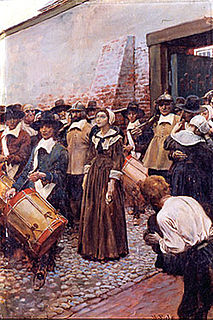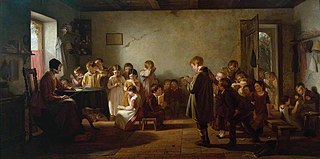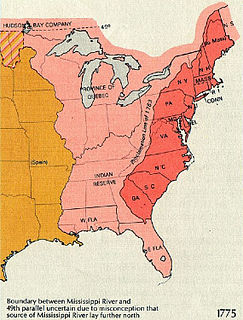Related Research Articles

The Puritans were English Protestants in the 16th and 17th centuries who sought to purify the Church of England of Roman Catholic practices, maintaining that the Church of England had not been fully reformed and should become more Protestant. Puritanism played a significant role in English history, especially during the Protectorate.

The Massachusetts Bay Colony (1630–1691), more formally The Colony of Massachusetts Bay, was an English settlement on the east coast of America around the Massachusetts Bay, the northernmost of the several colonies later reorganized as the Province of Massachusetts Bay. The lands of the settlement were in southern New England, with initial settlements on two natural harbors and surrounding land about 15.4 miles (24.8 km) apart—the areas around Salem and Boston, north of the previously established Plymouth Colony. The territory nominally administered by the Massachusetts Bay Colony covered much of central New England, including portions of Massachusetts, Maine, New Hampshire, and Connecticut.

Plymouth Colony was an English colonial venture in America from 1620 to 1691 at a location that had previously been surveyed and named by Captain John Smith. The settlement served as the capital of the colony and developed as the town of Plymouth, Massachusetts. At its height, Plymouth Colony occupied most of the southeastern portion of Massachusetts.
Solomon Stoddard was the pastor of the Congregationalist Church in Northampton, Massachusetts Bay Colony. He succeeded Rev. Eleazer Mather, and later married his widow around 1670. Stoddard significantly liberalized church policy while promoting more power for the clergy, decrying drinking and extravagance, and urging the preaching of hellfire and the Judgment. The major religious leader of what was then the frontier, he was known as the "Puritan Pope of the Connecticut River valley" and was concerned with the lives of second-generation Puritans. The well-known theologian Jonathan Edwards (1703–1758) was his grandson, the son of Solomon's daughter, Esther Stoddard Edwards. Stoddard was the first librarian at Harvard University and the first person in American history known by that title.

The New Haven Colony was a small English colony in North America from 1637 to 1664 primarily in parts of what is now the state of Connecticut, but also with outposts in modern-day New York, New Jersey, Pennsylvania, and Delaware.

The Blue Laws of the Colony of Connecticut are an invented set of harsh statutes governing conduct in the Puritan colony, listed in a history of Connecticut that was published in 1781 in London by the Reverend Samuel Peters, an Anglican who had been forced to leave America. Peters' book popularized the term "blue laws", referring to laws restricting activities on Sunday.

Mary Dyer was an English and colonial American Puritan turned Quaker who was hanged in Boston, Massachusetts Bay Colony, for repeatedly defying a Puritan law banning Quakers from the colony. She is one of the four executed Quakers known as the Boston martyrs.

Samuel Gorton (1593–1677) was an early settler and civic leader of the Colony of Rhode Island and Providence Plantations and President of the towns of Providence and Warwick. He had strong religious beliefs which differed from Puritan theology and was very outspoken, and he became the leader of a small sect of converts known as Gortonians, Gortonists or Gortonites. As a result, he was frequently in trouble with the civil and church authorities in the New England colonies.

The Cambridge Rindge and Latin School, also known as CRLS or "Rindge," is a public high school in Cambridge, Massachusetts, United States. It is a part of the Cambridge Public School District. In 1977, two separate schools, the Rindge Technical School and Cambridge High and Latin School, merged to form the Cambridge Rindge and Latin School. The newly built high school at the time increased its capacity to more than 2,000 students from all four grades.

Compulsory education refers to a period of education that is required of all people and is imposed by the government. This education may take place at a registered school or at other places.

Dame schools were small, privately run schools for young children that emerged in the British Isles and its colonies during the early modern period. These schools were taught by a “school dame,” a local woman who would educate children for a small fee. Dame schools were extremely localized, and could typically be found at the town or parish level.

Samuel Danforth (1626–1674) was a Puritan minister, preacher, poet, and astronomer, the second pastor of The First Church in Roxbury and an associate of the Rev. John Eliot of Roxbury, Massachusetts, known as the “Apostle to the Indians.”
Christopher Holder (1631–1688), was an early Quaker evangelist who was imprisoned and whipped, had an ear cut off, and was threatened with death for his religious activism in the Massachusetts Bay Colony and in England. A native of Gloucestershire, near Bristol in western England, Holder became an early convert to the Society of Friends, and in 1656, at the age of 25, made his first voyage to New England aboard the Speedwell to spread his Quaker message. All of the Quakers in his group were imprisoned, and then sent back to England on the same ship. Undeterred, Holder returned to New England aboard the small barque Woodhouse, landing in New Amsterdam in August 1657 despite few predictions of success. Though young, he was a leader among the eleven Quaker missionaries that fanned out among the American colonies. Holder, with his frequent companion John Copeland, went north to the Massachusetts Bay Colony to begin their evangelistic efforts in the face of increasingly threatening anti-Quaker laws. With little success on Martha's Vineyard, they moved to Cape Cod where they were warmly received in Sandwich, establishing the earliest Quaker meeting in America.
The Dorothy Talbye Trial is an early American example of execution of an insane woman for murder, at a time when the insane were treated no differently from ordinary criminals. Talbye was hanged in 1639 for killing her three-year-old daughter. She claimed that God told her to do so. Although Puritan Governor John Winthrop of the Massachusetts Bay Colony considered Talbye to be possessed by Satan, the penalty for murder was necessarily death.

Major-General Daniel Gookin was a Munster colonist, settler of Virginia and Massachusetts, and a writer on the subject of American Indians.

Christmas celebrations in New England were illegal during parts of the 17th century, and were culturally taboo or rare in former Puritan colonies from foundation until the mid-18th century. The Puritan community found no scriptural justification for celebrating Christmas, and associated such celebrations with paganism and idolatry. Indeed, Christmas celebrations in 17th-century England involved Carnival-like behavior including role inversion, heavy drinking, and sexual liberties.

In the early 17th century, thousands of English Puritans colonized North America, mainly in New England. Puritans were generally members of the Church of England who believed that the Church of England was insufficiently reformed, retaining too much of its Roman Catholic doctrinal roots, and who therefore opposed royal ecclesiastical policy under Elizabeth I of England, James I of England, and Charles I of England. Most Puritans were "non-separating Puritans" who did not advocate setting up separate congregations distinct from the Church of England; these were later called Nonconformists. A small minority of Puritans were "separating Puritans" who advocated setting up congregations outside the Church. The Pilgrims were a Separatist group, and they established the Plymouth Colony in 1620. Non-separating Puritans played leading roles in establishing the Massachusetts Bay Colony in 1629, the Saybrook Colony in 1635, the Connecticut Colony in 1636, and the New Haven Colony in 1638. The Colony of Rhode Island and Providence Plantations was established by settlers expelled from the Massachusetts Bay Colony because of their unorthodox religious opinions. Puritans were also active in New Hampshire before it became a crown colony in 1691.

Aboriginal title statutes in the Thirteen Colonies were one of the principal subjects of legislation by the colonial assemblies in the Thirteen Colonies. With the exception of Delaware, every colony codified a general prohibition on private purchases of Native American lands without the consent of the government. Disputes were generally resolved by special interest legislation or war. Mohegan Indians v. Connecticut (1705–73), a lawsuit that proceeded for 70 years under special royal enabling acts only to be dismissed on non-substantive grounds, was the first and only judicial test of indigenous tenure.
John Greene Sr. was an early settler of the Colony of Rhode Island and Providence Plantations, one of the 12 original proprietors of Providence, and a co-founder of the town of Warwick in the colony, sailing from England with his family in 1635. He first settled in Salem in the Massachusetts Bay Colony, but he had difficulty with the Puritan authority and soon followed Roger Williams to Providence, becoming one of the original proprietors of that town. In 1643, he joined Samuel Gorton and ten others in purchasing land that became the town of Warwick. Difficulties with Massachusetts ensued, until he accompanied Gorton on a trip to England where they secured royal recognition of their town.
The General Court of Massachusetts Bay Colony enacted a law in November 1646 providing, among other things, for the capital punishment of male children that were disobedient to their parents. Although death as a penalty was later removed and punishment for disobedient daughters was added, the law was not repealed until 1973. Similar laws were enacted in Connecticut in 1650, Rhode Island in 1688, and New Hampshire in 1679.
References
- 1 2 3 4 5 Eric R. Eberling, Massachusetts Education Laws of 1642, 1647, and 1648", in "Historical Dictionary of American Education, ed. Richard J. Altenbaugh. Greenwood Press, 1999. ISBN 0-313-28590-X
- ↑ Patrick W. Shannon, Broken Promises: Reading Instruction in Twentieth-Century America, p. 3. Praeger/Greenwood, 1989. ISBN 0-89789-161-9
- ↑ Andrew J. Milson (ed.), Readings In American Educational Thought: From Puritanism to Progressivism, p. 1. IAP, 2004. ISBN 1-59311-253-X
- ↑ Thomas C. Hunt, "Bible Reading", in Historical Dictionary of American Education, ed. Richard J. Altenbaugh. Greenwood Press, 1999. ISBN 0-313-28590-X